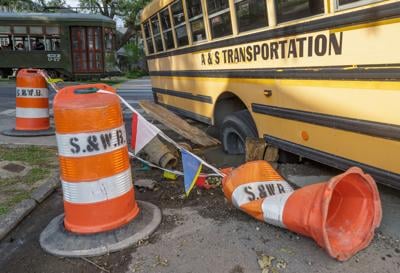The New Orleans Sewerage & Water Board is no stranger to bad news. Nary a month seems to go by without some sort of flooding incident, boil advisory, employee scandal or major equipment malfunction making headlines. But, even by S&WB standards, the last week has been rough — and it comes at the worst possible moment. To recap:
• On March 18, Mayor LaToya Cantrell informed the City Council that S&WB’s estimated $32.5 million price tag for phase one of its flood pump power substation was off by at least $20 million. If the city’s drainage system is to have the urgently needed, modern power source by the 2025 hurricane season, she said, the council will need to find the extra money as soon as possible.
• On March 19, longtime S&WB watchdog Matt McBride called the public’s attention to a recent S&WB report given to the City Council acknowledging that more than 75% of the drinking water the agency treated in the last quarter of 2023 never made it to the taps of rate payers. That previously unnoticed — but utterly astounding — statistic proves what many have long suspected: Things at S&WB are getting worse, not better. For years, S&WB reported that roughly half of the city’s drinking water was lost to non-paying entities like nonprofits or the zoo, leaks or major breaks in antiquated water pipes, many of which are nearly a century old. The average loss rate for all of 2023 was 68%, the report stated.
• On March 20, S&WB announced that Turbine 4, which has been offline since early February, had gone down because of “operator error.” Worse, the long-troubled, outdated pump won’t return to use until late July — two months into this year’s hurricane season. That means waterlogged New Orleanians, even those who live in historically high and dry neighborhoods, should expect continued flooding during normal rain events — and prayerful residents should light some votive candles if a major storm approaches.
Now for the really bad news: Gov. Jeff Landry and his Republican allies at the state level want to reduce if not eliminate local oversight of S&WB. There’s growing — and justified — concern that Landry will use his S&WB task force as political cover to privatize the city's sewerage and drinking water operations and infrastructure — but provide no state money to the beleaguered agency. Instead, Landry’s plan would force huge rate hikes on New Orleanians who already get “soaked” regularly by S&WB.
The board’s woes could allow Landry to argue that the state needs to take over S&WB in order to save New Orleanians from additional failures.
Such logic, if you can call it that, fails to note that privatization has made things worse — and more expensive — in many communities. Consider Jackson, Mississippi, where privatization in 2017 led to nearly 5 billion gallons of untreated or partially treated wastewater getting dumped into the Pearl River between 2020 and 2022 — triggering $90 million in settlement costs.
Water is a precious public resource. We must not allow anyone to turn it into an expensive, unregulated private commodity.
The pathway to political hell is paved with bad intentions.





